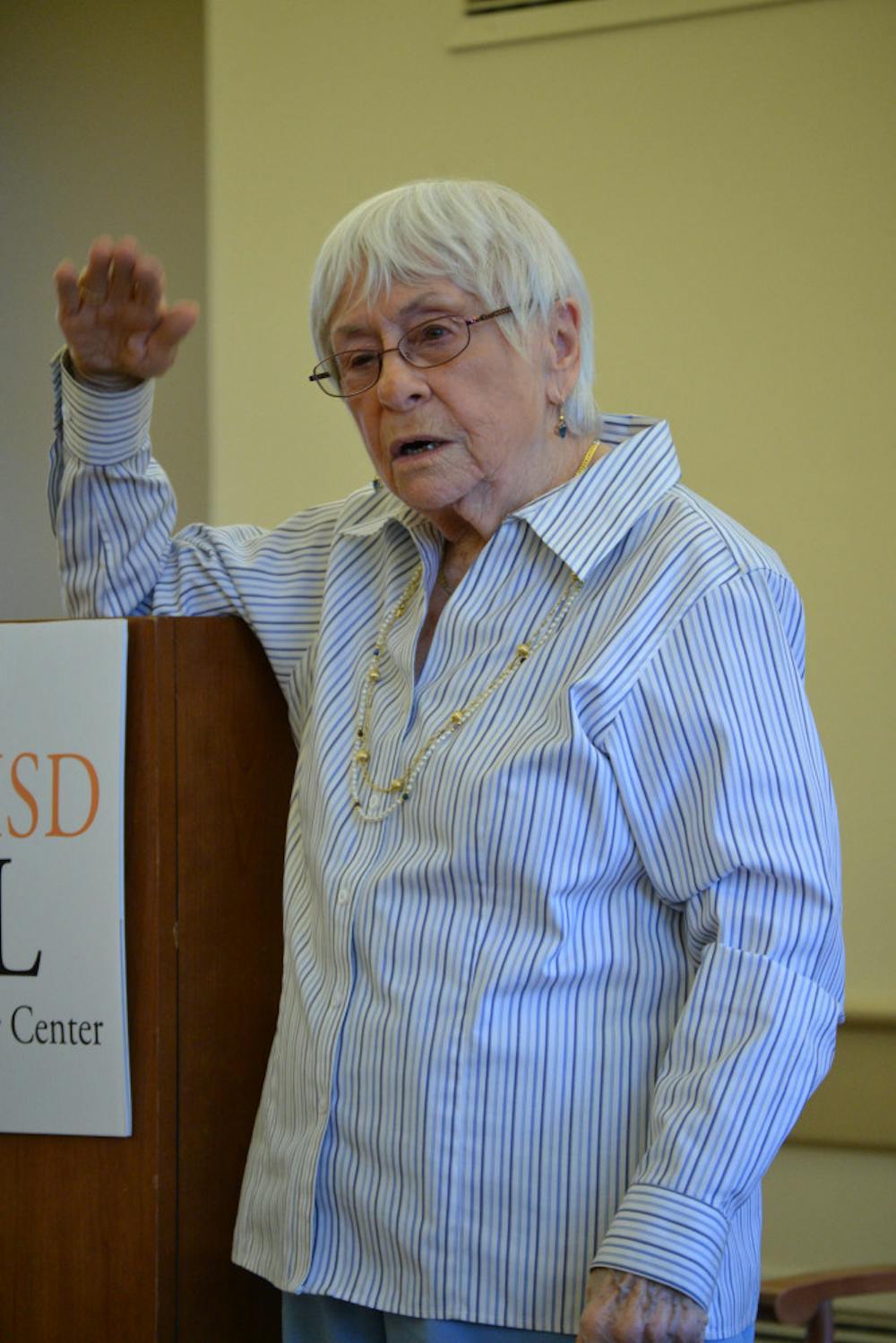At 94 years old, Esther Adler stepped out from behind a podium that was almost as tall as she was to speak at Brown-RISD Hillel Sunday night. The first thing she said to an almost entirely filled room was that she doesn’t really like to refer to herself as a survivor of the Holocaust.
“Until some years ago, I never called myself a survivor because I felt that the people who suffered in ghettos and went through camps, they are the survivors,” Adler said. She was fifteen when she escaped Germany and traveled with a Jewish youth group to Jerusalem. Though she made it out of Germany alive, Adler said many of her family members and friends did not.
Adler was invited to speak at Hillel for Yom Hashoah, or Holocaust Memorial Day, on April 11. Adler said she doesn’t use the word Holocaust to describe what happened at the hands of the Nazi party to people of the Jewish faith.
“The word Holocaust comes from Greek and its means a burnt offering. And I thought that … this is not a good description for what the Holocaust, the Shoah represents,” Adler said, “The word shoah, the Hebrew word means a terrible happening, a terrible occurrence.”
The event was sponsored by the Holocaust Initiative at Brown University, Brown-RISD Hillel and Facing History and Ourselves.
“It’s something we do every year for Yom Hashoah. We have a service generally, which we had on April 11 and we also bring in a survivor if we’re able,” said Zoë Gilbard ’18, one of three student co-leaders who helped organized the project. “In past years we’ve had people who are living in Rhode Island or Massachusetts and are part of the local Jewish community to tell their story to answer questions,” she added.
“1933, that was the faithful (year) that Hitler came to power,” Adler said. Adler, who is of Polish descent, was only a child in Breslau, Germany when the country became a fascist state. Adler described Germany as a “disaster” after World War I, which facilitated Adolf Hitler’s rise to power. “He found a scapegoat,” Adler said, and added that his first targets were Jewish people.
In the walled-in “old city” section of Breslau, Adler felt a strong sense of community among a heavily Jewish population. “It was an atmosphere where we knew we belonged.”
Adler went to a private Jewish school where she studied Jewish history and Hebrew, in addition to other subjects. The section of the city in which she lived was incredibly homogenous. “I never had a non-Jewish friend,” Adler said of her time in Germany.
In 1935 after the Nuremberg Laws went into effect, Adler said her school was flooded by an influx of German-Jewish students who were no longer permitted to attend other public schools. Signs were put up on Jewish store fronts that read “Aryans don’t buy” and “Jews go to Palestine.”
Her family — which included her two working parents and three other siblings — typically had a maid while she was growing up until non-Jewish women who were younger than 45 years old were prohibited from working in a Jewish home as the government feared relationships between Jewish and non-Jewish individuals, she said.
“Every year brought new restrictions,” Adler added.
Adler noted that it was clear to her, even from a young age, that these rules were not normal. She is often asked, “Did you realize?” to which she replies, “Of course I did.”
“(Hitler) was totally ruling our city because in (every) corner (Nazis) had set up loudspeakers. So if I was outside, I couldn’t avoid his voice where ever I went.”
Even though she knew how terrible Hitler was, she said the Nazi marches were impressive. She added that once, she was so inspired by the music that she accidently started walking with them until she realized what she was doing.
It wasn’t until Kristallnacht, November 9 to 10, 1938, that she decided that she had to leave Germany. “The conditions were really closing in on us,” Adler said. Adler knew that some groups offered trips to Palestine, which was not yet the state of Israel. The first time she tried to apply she was 14, and she was denied.
“I counted the days until my birthday,” she said. On her birthday, she applied again and was sent to Palestine.
Adler would eventually move to the United States in 1947 when her mother fell ill. Although she hadn’t planned to stay in the United States, she met a man with “the most beautiful blue eyes” on her boat trip across the Atlantic who she eventually married.
Adler then dedicated her life to Jewish education and has written children’s books, plays and a novel entitled “Best Friends: A Bond That Survived Hitler.”
“Don’t be quiet, … that’s the worst,” Adler said. “Whatever religion, whatever background, you have to keep talking about this.”
“It was really moving I have never been to a talk about a Holocaust survivor before,” said Ilan Upfal, a prospective student visiting campus for A Day On College Hill. “I just wanted to come to bear witness to the tragedy, remind myself of it and learn more about it.”
Gilbard said that she hopes that events like this will inform more people about the Holocaust, and referenced the April 12 New York Times that said 41 percent of Americans don’t know what Auschwitz is.�� “The importance of Holocaust education only gets stronger as we get further away from the events,” Gilbard added.
Correction: An earlier version of this article stated that Kristallnacht took place on November 9, 1939. In fact, Kristallnacht took place November 9 to 10, 1938. The Herald regrets the error.




